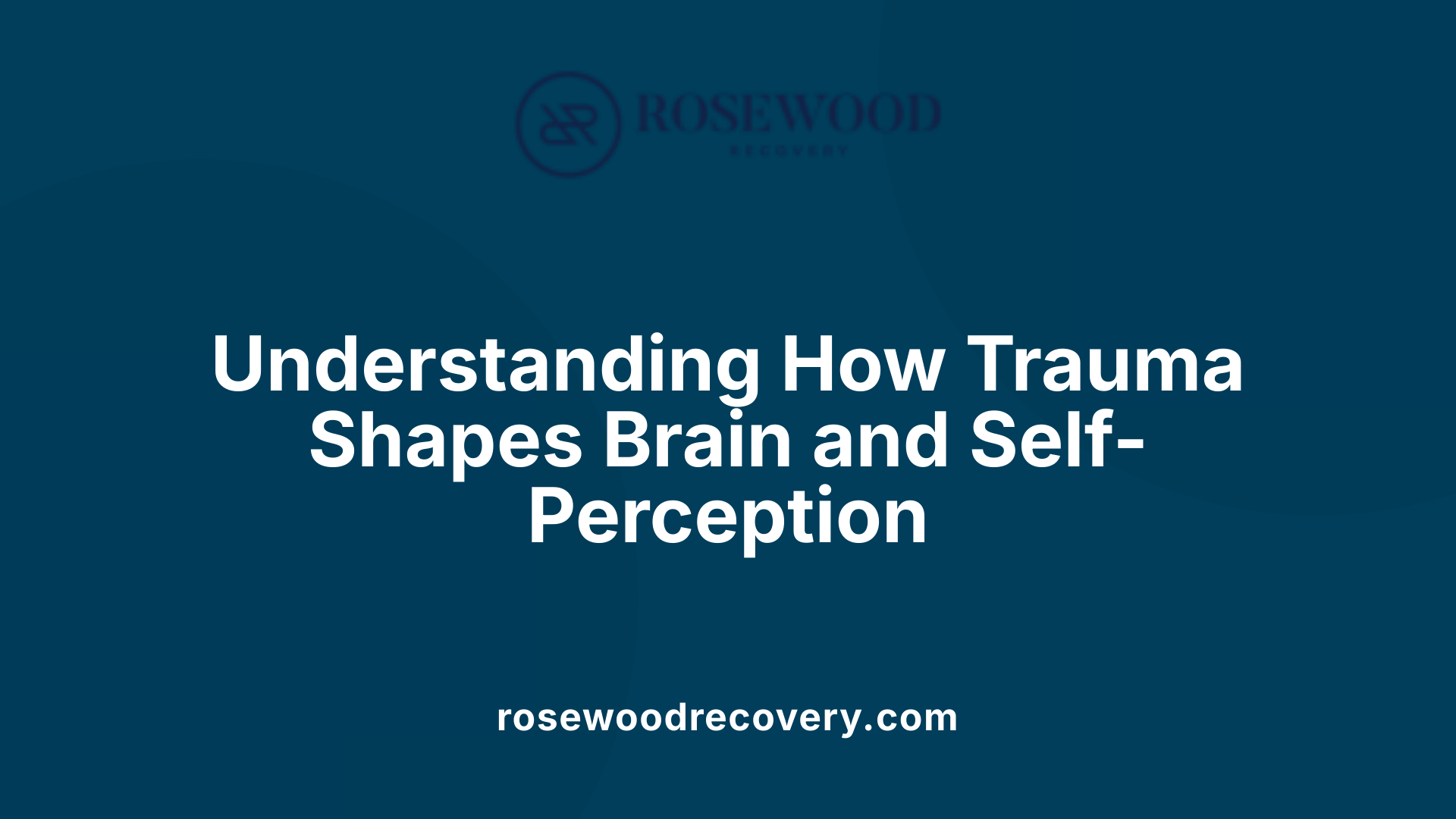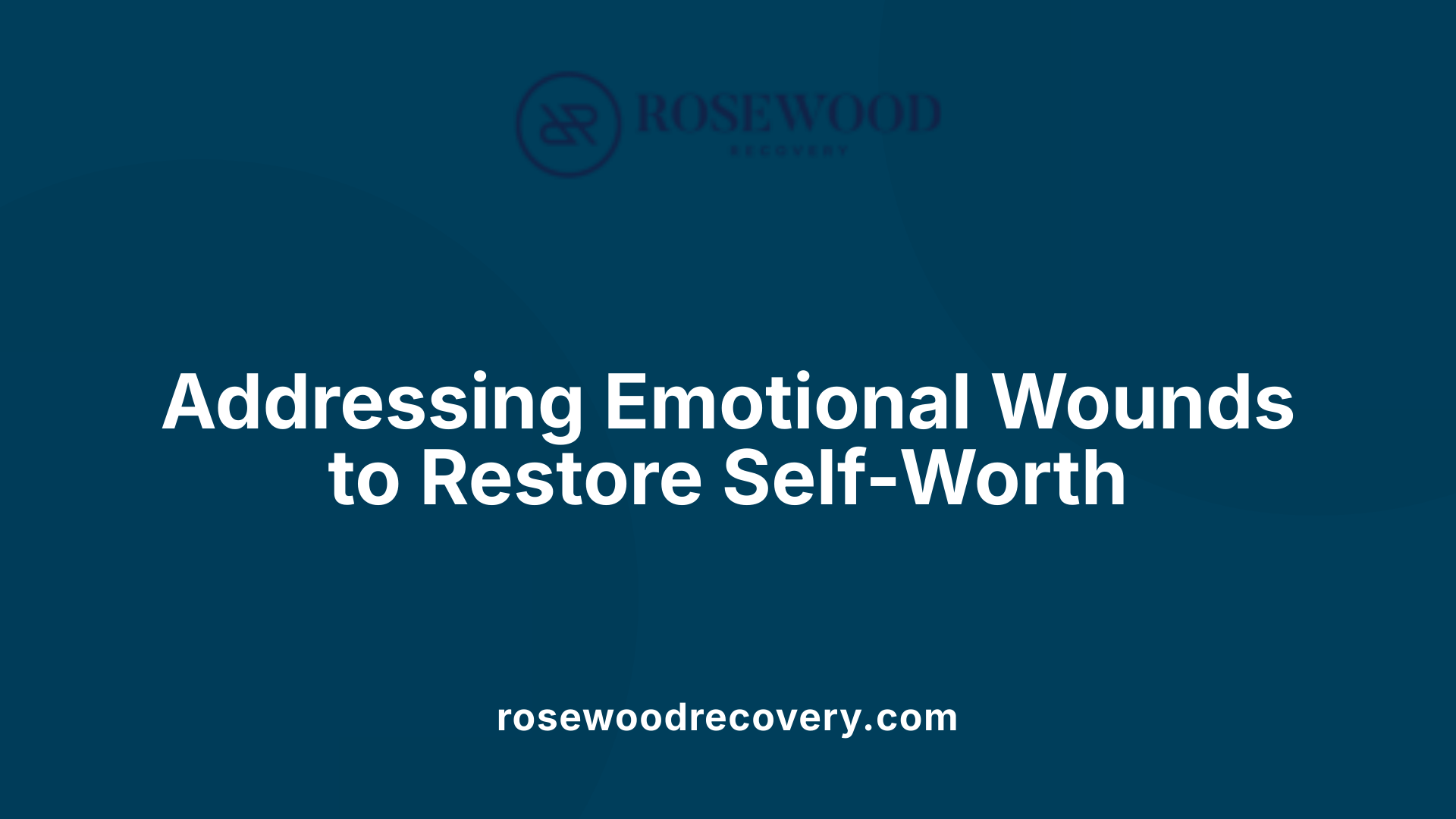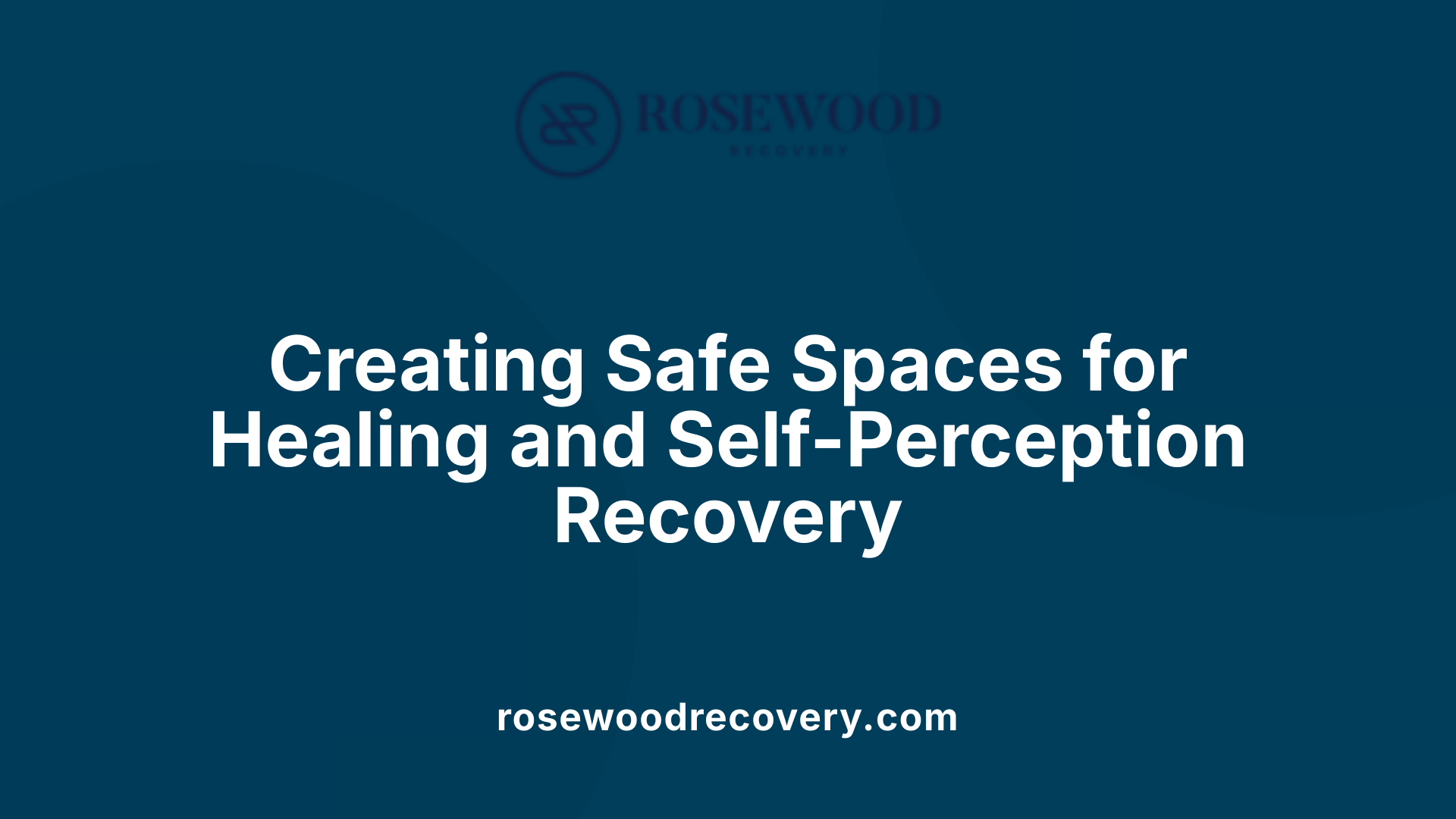Understanding the Deep-Seated Effects of Emotional Trauma
Emotional trauma, especially complex trauma resulting from prolonged adverse experiences, profoundly shapes how individuals perceive themselves and the world around them. Its impacts extend beyond immediate emotional distress, disrupting neurobiological functions, altering perceptions of time, disconnection from self, and impairing recovery processes. This article explores the intricate ways trauma influences self-perception, the importance of psychological education, and practical strategies for healing and fostering resilience.
The Neurobiological and Psychological Foundations of Trauma's Impact

How does trauma influence self-awareness and self-concept through neurobiological and psychological mechanisms?
Trauma profoundly affects both the brain's structure and function, which in turn shapes how individuals perceive themselves and their experiences. Neurobiologically, traumatic events can alter key brain areas involved in emotional regulation and self-awareness, including the amygdala, hippocampus, and prefrontal cortex.
The amygdala, which processes fear and threat detection, may become hyperactive following trauma, heightening stress responses and leading to feelings of danger or helplessness. The hippocampus, responsible for memory formation, can shrink or function less effectively, resulting in disrupted memory and a warped sense of time and self-continuity. Meanwhile, the prefrontal cortex, which moderates impulses and assesses risk, may become underactive, impairing emotional regulation and decision-making.
Physiological changes are also critical. Dysregulation of the hypothalamic-pituitary-adrenal (HPA) axis results in abnormal cortisol levels, amplifying stress reactions and affecting brain development, especially when trauma occurs early in life.
Psychologically, trauma distorts core beliefs about oneself, often fostering feelings of worthlessness, shame, and guilt. It can lead to dissociation — a protective mechanism where individuals detach from painful thoughts or feelings, which further hampers self-awareness and self-identity.
Early exposure to trauma during crucial developmental periods can cause lasting structural and functional brain modifications. These changes contribute to negative self-perceptions, such as feeling damaged or unworthy, which can persist well into adulthood.
Trauma also reorganizes neural networks supporting emotional intelligence (EI). For example, studies show that trauma reduces activity in the salience network (SN), which detects and filters relevant stimuli, and alters the default mode network (DMN), associated with self-referential thoughts. In contrast, the central executive network (CEN), vital for problem-solving and goal-directed behavior, can become dysregulated.
Importantly, neuroplasticity—the brain's ability to reorganize itself—offers hope. Through therapies like trauma-informed practices, EMDR, and cognitive-behavioral approaches, these neural alterations can be partly reversed, restoring adaptive function and improving self-awareness.
In summary, trauma impacts self-perception through complex interactions of neural changes and psychological adaptations. The intertwined neurobiological and psychological mechanisms shape a distorted sense of self, but healing efforts can facilitate neural recovery and foster a healthier self-concept.
Trauma's Disruption of Perceived Time and Sense of Disconnection
How does trauma affect perceptions of time, disconnection, and the healing process?
Trauma has a profound impact on how individuals perceive time and their sense of self and connection to others. One common effect is the distortion of perceptions of time, where traumatic memories may feel as if they are unfolding in the present rather than a distant past. People often describe experiences where they relive traumatic events through flashbacks or triggers, resulting in a feeling that the trauma is happening all over again. This re-experience can make it difficult to distinguish between past and present, creating a disorienting sense of being stuck or caught in a cycle.
Alongside these temporal distortions, trauma can lead to disconnection from oneself, others, and the world. Dissociation—a defense mechanism—serves to protect from overwhelming feelings by severing emotional or cognitive ties. This results in emotional numbness, detachment, or feelings of being an outsider in one's own life. Such experiences erode trust and impair emotional connections, leaving individuals feeling isolated and disconnected.
This disruption extends beyond emotional and cognitive aspects. It involves biological changes, especially in brain networks responsible for processing self-awareness and emotional regulation, like the default mode network (DMN). These neural alterations can hinder coherence between thoughts, feelings, and memories, making it challenging to form a continuous sense of identity.
Fortunately, healing from these perception distortions is possible through targeted therapies. Eye Movement Desensitization and Reprocessing (EMDR) is a well-established approach that helps reprocess traumatic memories, reducing their emotional impact and restoring a more accurate perception of time. Mindfulness and other grounding techniques also assist in reconnecting individuals to the present moment, helping rebuild biological and cognitive coherence. As trauma-related neural pathways are addressed, individuals often experience a regained sense of safety, continuity, and emotional stability.
In summary, trauma affects perceptions of time and disconnection by disrupting mental, emotional, and biological systems. With professional support and appropriate therapeutic interventions, those affected can work toward restoring a healthy sense of time, Self, and connection, fostering long-term recovery and resilience.
The Role of Emotional and Psychological Impact on Self-Perception and Self-Esteem

How does emotional trauma impact self-worth, boundaries, guilt, and emotional regulation?
Emotional trauma can deeply affect how individuals view themselves and relate to others. One of the most significant consequences is a negative belief system, where survivors often internalize feelings of worthlessness or unlovability. Common thoughts like "I’m not good enough" or "I am not lovable" stem from distorted self-perceptions reinforced by traumatic experiences.
Trauma disrupts personal boundaries by impairing trust in others and oneself. This can lead either to overly rigid boundaries, where individuals isolate themselves to avoid vulnerability, or to overly porous boundaries, making them vulnerable to further harm or manipulation. Such boundary issues contribute to feelings of guilt and shame, which tend to be internalized, reducing self-esteem further.
Moreover, trauma impairs emotional regulation, making it challenging to manage feelings such as anger, fear, sadness, or anxiety. Survivors might experience emotional dysregulation characterized by mood swings, outbursts, numbness, or detachment. This dysregulation perpetuates a cycle where negative self-perceptions are reinforced, making it harder to recover.
Addressing these interconnected effects often requires trauma-informed therapies like EMDR, CBT, or DBT, which help reframe negative beliefs, restore boundaries, promote emotional stability, and rebuild self-worth. With support and appropriate treatment, survivors can gradually foster resilience, recognize their inherent value, and develop healthier ways of relating to themselves and others.
Healing Strategies: From Self-Compassion to Trauma-Informed Therapy
What practical methods support healing from trauma, such as self-compassion and emotional regulation techniques?
Healing from trauma involves a combination of self-guided practices and professional interventions aimed at restoring emotional balance and rebuilding a sense of safety. Cultivating self-compassion is a cornerstone of recovery. This can be achieved through loving-kindness meditation, which encourages kindness towards oneself, and by practicing self-compassion breaks or acceptance, helping to reduce feelings of shame and self-criticism.
Managing intense emotions is crucial in trauma recovery. Techniques like mindfulness—being present without judgment—help ground individuals in the moment, reducing emotional overwhelm. Grounding exercises, such as focusing on the breath or physical sensations, support nervous system regulation.
Therapies like Dialectical Behavior Therapy (DBT) and Acceptance and Commitment Therapy (ACT) specifically teach skills for emotional regulation, distress tolerance, and acceptance, fostering resilience over time.
Physical activity, like walking or yoga, plays a significant role in soothing the nervous system. Maintaining social connections creates a support network, providing emotional safety and validation.
Creating a safe environment at home or in treatment settings allows for the processing of traumatic memories without feeling overwhelmed.
Taking care of physical health also supports mental health. Adequate sleep, balanced nutrition, and stress-reducing practices like deep breathing, meditation, or gentle movement strengthen the body's capacity for healing.
For more complex symptoms—such as intrusive memories or dissociation—professional trauma-informed therapies are recommended. Eye Movement Desensitization and Reprocessing (EMDR), somatic experiencing, and trauma-focused cognitive-behavioral therapy (CBT) are effective methods that directly address traumatic memories and bodily sensations.
Combining these approaches—self-compassion, mindfulness, physical care, and professional therapy—creates a comprehensive pathway toward healing and rebuilding a positive self-perception after trauma.
Rebuilding Self-Esteem and Personal Agency Post-Trauma

What strategies can help recover from trauma and rebuild a positive self-image?
Recovering from trauma and restoring a positive self-view involve multiple supportive strategies. Engaging in trauma-informed therapies such as Eye Movement Desensitization and Reprocessing (EMDR), Cognitive Processing Therapy (CPT), and Cognitive Behavioral Therapy (CBT) is fundamental. These approaches help individuals process distressing memories and challenge negative beliefs about themselves.
Practicing self-compassion plays a vital role. This involves treating oneself with kindness, recognizing shared human experiences, and avoiding self-criticism. Incorporating mindfulness techniques like meditation and deep breathing also helps ground emotions and improve emotional regulation.
Setting small, manageable goals is essential to regain a sense of control and achievement. These goals should be realistic and focus on positive progress, reinforcing feelings of competence and confidence.
Building a strong support network—comprising friends, family, and mental health professionals—fosters a sense of safety and belonging. Establishing healthy boundaries is equally important to protect oneself from further harm and to reinforce personal agency.
Reconstructing personal narratives involves revisiting and reframing traumatic experiences to create a coherent and empowering story of resilience. Recognizing individual strengths and resilience Stories can boost self-confidence and foster hope.
In sum, a combination of therapeutic interventions, self-care routines, and supportive relationships creates a comprehensive pathway for healing. Through these efforts, individuals can rebuild their self-esteem, reclaim personal agency, and move toward a healthier, more positive self-identity.
The Power of Trauma-Informed Care and Support in Recovery

What role does trauma-informed care and therapy play in healing and improving self-perception?
Trauma-informed care and therapy are essential in the journey towards healing from complex trauma, especially when it comes to reshaping negative self-perception. These approaches focus on creating environments that feel safe and supportive, which helps trauma survivors start to rebuild their sense of trust and control.
By acknowledging the profound impact trauma has on emotions, thoughts, and behaviors, trauma-informed frameworks guide both practitioners and survivors in addressing core issues such as emotional dysregulation, shame, and guilt. Evidence-based therapies like Eye Movement Desensitization and Reprocessing (EMDR), Trauma-Focused Cognitive Behavioral Therapy (TF-CBT), and somatic therapies focus on processing traumatic memories and reducing their emotional charge.
Principles like safety, transparency, cultural sensitivity, and client agency are central to trauma-informed care. These principles help prevent retraumatization—a common risk when traumatic memories are awakened without proper support—and foster resilience. When individuals feel heard, validated, and empowered, they are more likely to challenge negative beliefs like "I am unworthy" or "I am damaged."
Creating a space grounded in trust and respect enables trauma survivors to explore and reframe their experiences. This supportive process can lead to a more positive self-view, stronger self-esteem, and a renewed sense of hope. Overall, trauma-informed care not only addresses symptoms but also promotes long-term recovery, enhancing mental health and well-being.
Principles and benefits of trauma-informed care
| Principle | Description | Benefit |
|---|---|---|
| Safety | Prioritizing physical and emotional safety | Reduces retraumatization and builds trust |
| Transparency | Clear communication about processes and expectations | Promotes trust and autonomy |
| Cultural Sensitivity | Respecting diverse backgrounds and experiences | Increases engagement and relevance |
| Client Empowerment | Encouraging choice and agency | Fosters resilience and self-worth |
Creating safe, empowering environments
- Establish welcoming, predictable settings.
- Use language and practices that validate experiences.
- Involve individuals in their treatment planning.
Reducing retraumatization through sensitive approaches
- Avoid re-exposing individuals to traumatic triggers unexpectedly.
- Use gentle, paced interventions.
- Respect boundaries and readiness.
Facilitating long-term recovery and resilience
- Incorporate skills for emotional regulation and coping.
- Encourage social support and community connections.
- Promote ongoing self-awareness and self-compassion.
How trauma therapy supports growth
| Technique | Focus | Outcome |
|---|---|---|
| EMDR | Reprocessing traumatic memories | Reduced emotional distress |
| CBT | Challenging negative beliefs | Improved self-esteem |
| Mindfulness | Grounding and present-moment awareness | Enhanced emotional regulation |
Whether through individual therapy, support groups, or community programs, trauma-informed care offers a compassionate and effective pathway for individuals to recover, rebuild their self-worth, and develop the resilience needed for a fulfilling life.
Pathways to Hope and Healing
Understanding how emotional trauma impacts self-perception and recovery underscores the importance of holistic approaches that integrate neurobiological, psychological, and social support mechanisms. Trauma can distort perceptions, undermine self-esteem, and fragment identity, but with targeted therapies, education, and compassionate support, individuals can work towards reconnecting with their authentic selves. Reclaiming a sense of safety, practicing self-compassion, and engaging in trauma-informed care are pivotal to healing. While the journey may be complex, hope lies in the brain’s plasticity and the strength of human resilience, illustrating that recovery and a positive self-image are attainable through dedicated effort and support.
References
- How It Impacts Your Emotional Health and Self-Perception
- Understanding the Impact of Trauma - NCBI
- Trauma and Self-Esteem | Rebuilding a Positive Sense of Self
- The Behavioral Impacts of Trauma on Self - Integrative Life Center
- How Trauma Affects Self-Worth: Understanding the Connection and ...
- How past trauma impacts emotional intelligence - Frontiers
- The impact of childhood trauma on children's wellbeing and adult ...




